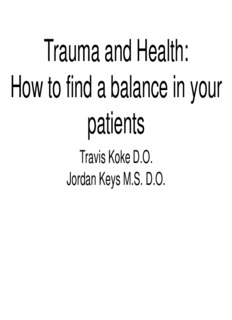
Trauma and Health - American Academy of Osteopathy PDF
Preview Trauma and Health - American Academy of Osteopathy
Trauma and Health: How to find a balance in your patients Travis Koke D.O. Jordan Keys M.S. D.O. Trauma?? trau·ma ˈtroumə,ˈtrô-/ noun noun: trauma; plural noun: traumata; plural noun: traumas •1. a deeply distressing or disturbing experience. • Microtrauma is the general term given to small injuries to the body. Tenets of Osteopathy • The human being is a dynamic unit of function. • The body possesses self-regulatory mechanisms that are self-healing in nature. • Structure and function are interrelated at all levels. • Rational treatment is based on these principles. Objectives • Introduction to nutrition, nutrients and therapeutic role. • Introduction to proper poster and biomechanics. • Introduce how the microtrauma of poor posture/biomechanics and nutrition can lead to long term disease and dysfunction. • “Let food be thy medicine and medicine be thy food” » Hippocrates Nutrition • Nutrition: The science of how living organisms obtain and use food to support all the processes required for their existence. • Nutrients: substances in foods required or used by the body for at least one of the following: energy, structure or regulation of chemical reactions. Some have additional benefits such as decreasing risk of heart disease and cancer. Macro vs. Micronutrients • Macronutrients: – Require over one gram a day. – carbohydrates – proteins – lipids – water Nutrition • Micronutrients – Require micrograms or milligrams a day. – minerals – vitamins • Phytonutrients/zoonutrients Nutrients • Essential: must be obtained from diet because the body cannot make or make in adequate amounts. • Non-essential: body can make in amounts needed to satisfy it’s physiological requirements. • Conditionally essential: during times of higher demand certain non-essential nutrients can become essential (i.e. older children and adults only have two essential lipids whereas babies require four).
Description: